

The World Is Fat: Obesity Now Outweighs Hunger WorldWide: Scientific American Podcast. Welcome to Science Talk, the weekly podcast of Scientific American for the seven days starting August 22nd.
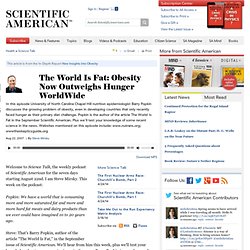
I am Steve Mirsky. This week on the podcast: Popkin: We have a world that is consuming more and more saturated fat and more and more hard fat meats and dairy products than we ever could have imagined 10 to 20 years ago. Steve: That's Barry Popkin, author of the article "The World Is Fat," in the September issue of Scientific American. We'll hear from him this week, plus we'll test your knowledge about some recent science in the news. Steve: Hi Professor Popkin. Popkin: Fantastic! Steve: Tell me about this article and this subject, "the world is fat. " Popkin: Yeah! Steve: When you say move less, you mean, actually walk less or bicycle less? Popkin: Walk less, lift less, sit more. Steve: And worldwide, the figures are astounding. Popkin: Right!
Steve: You talk in the article about the situation in Mexico and how it has changed in less than one generation, it’s astounding. Weight and mortality. In January, when the Journal of the American Medical Association (JAMA) published a meta-analysis of 100 studies that probed the relationship between body mass index and mortality — studies that found slightly overweight people have lower all-cause mortality than normal weight and underweight people — media around the globe trumpeted the news.
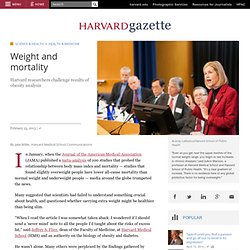
Many suggested that scientists had failed to understand something crucial about health, and questioned whether carrying extra weight might be healthier than being slim. “When I read the article I was somewhat taken aback. I wondered if I should send a ‘never mind’ note to all the people I’d taught about the risks of excess fat,” said Jeffrey S. Flier, dean of the Faculty of Medicine, at Harvard Medical School (HMS) and an authority on the biology of obesity and diabetes. He wasn’t alone. Information in context Methodological errors. Higher Levels of Obesity Associated With Increased Risk of Death; Being Overweight Associated With Lower Risk of Death. FOR RELEASE: 3 P.M.
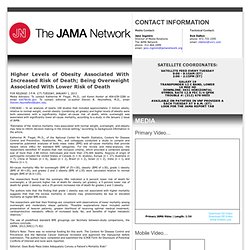
(CT) TUESDAY, JANUARY 1, 2013 Media Advisory: To contact Katherine M. Flegal, Ph.D., call Karen Hunter at 404-639-3286 or email ksh7@cdc.gov. To contact editorial co-author Steven B. Heymsfield, M.D., email Steven.heymsfield@pbrc.edu. CHICAGO – In an analysis of nearly 100 studies that included approximately 3 million adults, relative to normal weight, overall obesity (combining all grades) and higher levels of obesity were both associated with a significantly higher all-cause risk of death, while overweight was associated with significantly lower all-cause mortality, according to a study in the January 2 issue of JAMA. “Estimates of the relative mortality risks associated with normal weight, overweight, and obesity may help to inform decision making in the clinical setting,” according to background information in the article.
Katherine M. The use of predefined standard BMI groupings can facilitate between-study comparisons, the authors conclude. Being healthy and obese is a myth, researchers say. People who are obese and have normal blood pressure, cholesterol and blood-sugar readings will still be unhealthy and die sooner compared with people who have a normal body weight, according to researchers.
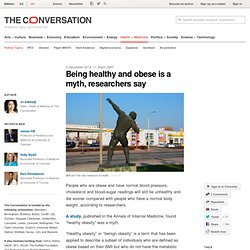
A study, published in the Annals of Internal Medicine, found “healthy obesity” was a myth. “Healthy obesity” or “benign obesity” is a term that has been applied to describe a subset of individuals who are defined as obese based on their BMI but who do not have the metabolic abnormalities typically seen in obesity (such as increased blood pressure, increased blood glucose and abnormal lipid profile), according to Ravi Retnakaran, an endocrinologist and co-author of the study. People with a BMI of 30-40 are considered to be obese. But while health problems associated with being obese such as an increased risk of Type 2 diabetes and cardiovascular disease are well documented, not all obese people show unhealthy signs that would suggest a problem.
Fat crash victims 80% more likely to die. If you are overweight, your chances of dying in a car accident are greatly increased, according to a new study.
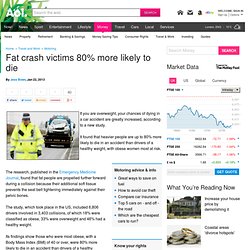
It found that heavier people are up to 80% more likely to die in an accident than drivers of a healthy weight, with obese women most at risk. The research, published in the Emergency Medicine Journal, found that fat people are propelled further forward during a collision because their additional soft tissue prevents the seat belt tightening immediately against their pelvic bones.